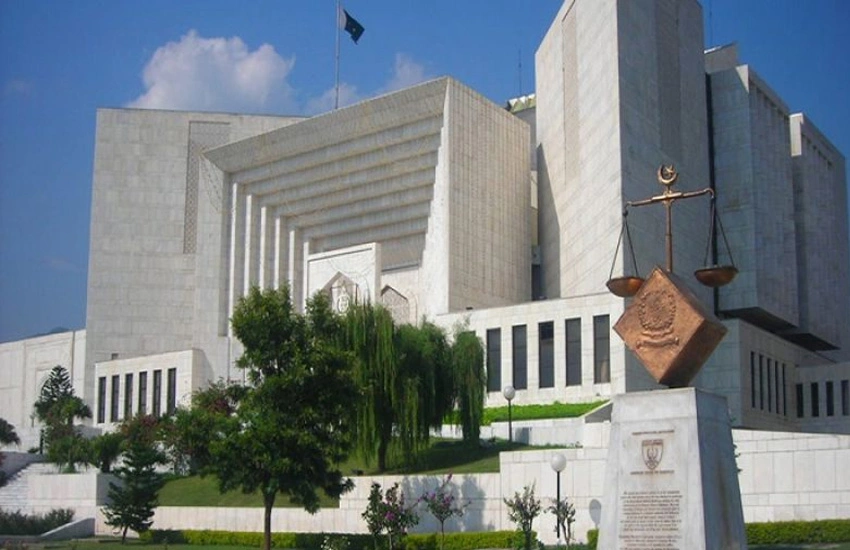- Web Desk
- Feb 19, 2026
No constitutional limit on duration of judges’ transfer, says Justice Salahuddin
-

- Web Desk Ahsan Wahid
- May 23, 2025

ISLAMABAD: The five-member bench of the Constitutional Bench of Supreme Court, headed by Justice Muhammad Ali Mazhar, resumed hearing of the case related to transfer of judges and seniority. Lawyer of Sunni Ittehad Council (SIC), Faisal Siddique resumed his arguments from yesterday.
“The President has the constitutional authority to transfer,” Justice Mazhar said, adding that how can anyone force the President to transfer?
“Keep the arguments limited to the transfer of judges,” Justice Mazhar said to Faisal Siddique.
“You had said that judges do not negate the President’s authority on transfer,” Justice Afghan said to the counsel. Justice Salahuddin said to the counsel, “You said that I would focus on the issue of seniority in the arguments.”
“Judges are appointed from high courts to the Federal Shariat Court,” Lawyer Faisal Siddiqui said. The bench asked about the connection between the appointment of judges in the Federal Shariat Court and the issue of transfers of judges.
“The status of a judge’s appointment to the Shariat Court is higher than that of the High Court,” Justice Mazhar said, adding that the status of a judge’s transfer from a High Court to another High Court is equal.
“Judges cannot be permanently transferred,” lawyer Siddiqui’s said.
“It is not written anywhere in the Constitution that transfer will be for a limited time,” Justice Salahuddin Panhwar. Justice Mazhar added, “In India, if a judge refuses to be transferred, he has to go home. [But] in Pakistan, a transferred judge is asked for his consent.”
He quoted the example of a Sindh High Court (SHC) Chief Justice, who had refused to come to the Supreme Court, and yet he continued to perform his duties as the SHC Chief Justice. “How can the Supreme Court decide on the basis of the history of any previous legislation?” Justice Mazhar asked, adding that the basic question is whether the transferred judge will take a new oath or not.
The bench remarked that there is a difference in the arguments of the lawyers of the petitioners. Addressing the counsel, Justice Mazhar noted, “You said in the arguments that the transferred judge will have to take a new oath. On the other hand, it is being said that the transfer cannot be permanent. A judge will first take an oath, then transfer and take oath in the new High Court. Then after a limited time, the same judge will go back to his High Court and take the oath again,” he said.
“How can a judge take two or three oaths at the same time?” Justice Mazhar asked, adding that if a judge comes to a court after being transferred, then goes back and takes the oath again, then his first service is over.
Justice Shakeel Ahmed added, “The question will also arise, on from where will the seniority be calculated.”
Faisal Siddiqui, said that in that case there will be two seniority lists. Justice Mazhar asked, “Will a judge transfer for a limited time and go back to his High Court and take a new oath?” He asked, “Suppose Justice Dogar takes the oath on transfer. Then he takes the oath of his old High Court again, there his seniority will be the lowest. In such a case, the seniority of a new controversy will arise. If there was a single seniority list in all the High Courts in Pakistan like India, it would be a different matter. The seniority list of the judges of the High Courts in Pakistan is separate. How can a judge take two or three oaths at a time?”
Justice Naeem Akhtar Afghan added, “If a permanent judge can be appointed under Article 200, then in such a case the Judicial Commission will become ineffective. The three judges who came after being transferred took oaths separately in their respective High Courts. A judge says in his oath that he has to make decisions according to the Constitution and law. Without taking an oath, no judge can make decisions or hear a case.”
Justice Mazhar remarked that if a judge takes a new oath, the old oath will be null and void. “In the Supreme Court, there is a difference between an acting judge and a transferred judge.”
“There has been such a confusion due to which questions are being raised,” Justice Afghan said, adding, “Article 200 of the Constitution came first, Islamabad High Court was formed later.” He added that it is written in the Islamabad High Court Act that the Islamabad High Court will consist of the Chief Justice and 12 other judges.
“There is a mention of appointment of judges in the Islamabad High Court, there is no mention of transfer,” Justice Afghan said, adding, “It is written in the Act that judges will be taken from all four provinces, there is no mention of high courts. If there was to be transfer, it would have been written in the law.”
The bench noted that a meeting of the Judicial Commission was held 10 years before the appointment of Justice Dogar, during which the name of Sessions Judge from Balochistan, Raja Jawad Abbas, was considered. “If a permanent judge was to be brought from Balochistan, why was the name of Sessions Judge Raja Jawad Abbas dropped?” Justice Afghan asked, adding that this question is also for the Attorney General, he should answer in the next hearing.
Afterwards, the hearing of the case related to the transfer of judges in the Supreme Court has been adjourned until Monday. Lawyer Faisal Siddiqui will continue his arguments in the next hearing.
Also read: Constitutional Bench moves from judges ‘transfers’ to ‘seniority’ debate




